Republicans Drive Decline in Share of Americans Who See Police Violence as a Serious Problem
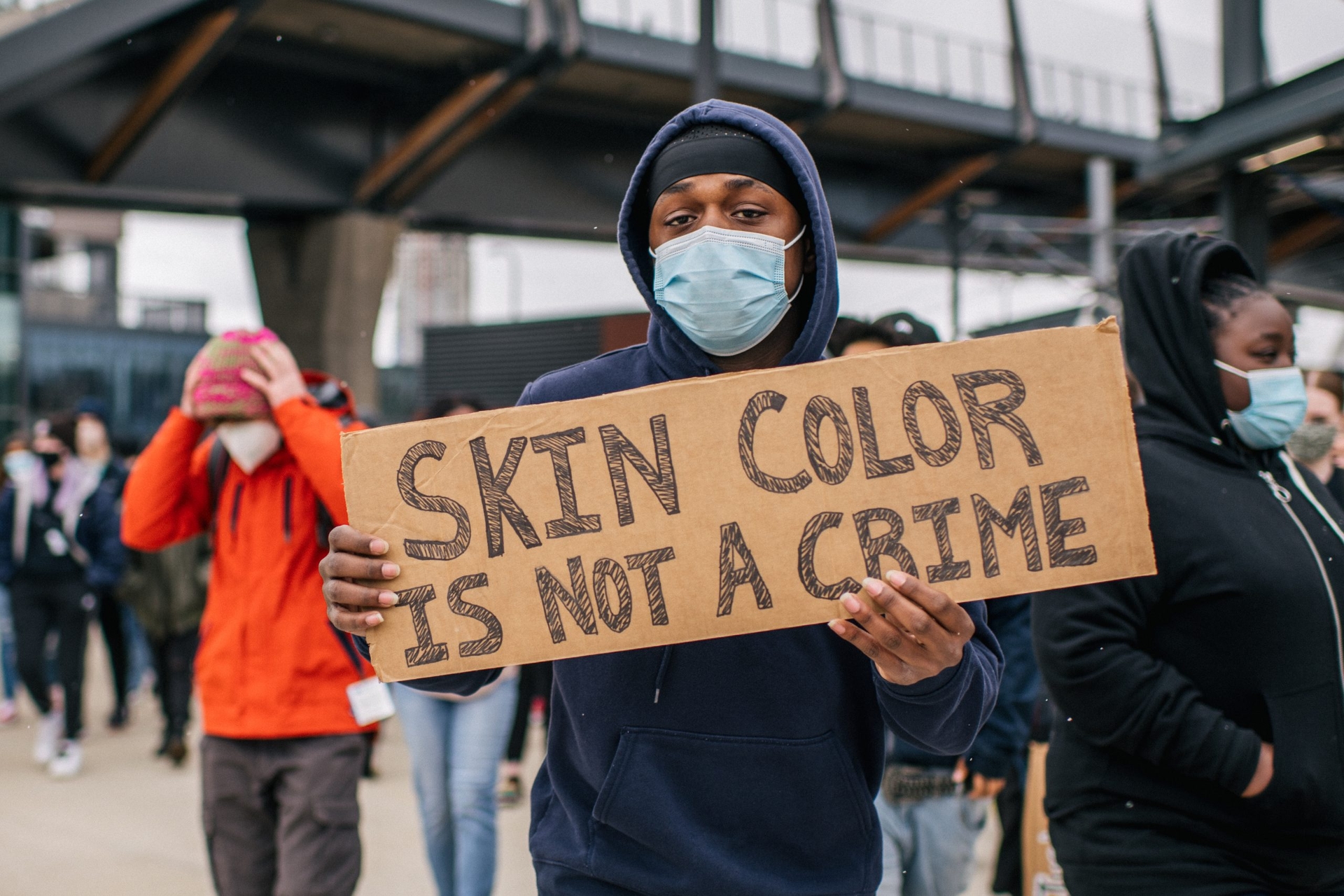
Key Takeaways
69% of Americans view police violence against the public as a serious problem in the country – down 10 points since a survey conducted after George Floyd’s death.
Republicans, Democrats and white adults are most likely to cite police officers’ mistakes as the cause of police violence, while Black adults are most likely to point to an officer’s weapon and lack of personal judgment.
Nearly 3 in 4 Democrats support charges against the officer who killed Daunte Wright, compared with 36 percent of Republicans.
Last summer, many Americans reacted to the death of George Floyd with at least the appearance of allyship, with a number of everyday Republicans recognizing Black Americans’ calls to stop police-involved violence against people of color in polling conducted at the time.
But nearly a year later – as Derek Chauvin, the former Minneapolis police officer accused of murdering Floyd, stands trial and details emerge about new police shootings of Daunte Wright in Brooklyn Center, Minn., and Adam Toledo in Chicago – Republicans are driving a drop in the share of Americans who consider police violence against civilians to be a serious problem, expanding racial rifts in the public’s views of the root causes and how to address the issue.
According to a new Morning Consult survey, conducted April 15-19, 69 percent of U.S. adults view police violence against the public as a “very” or “somewhat” serious problem in the country – down 10 percentage points since a survey conducted shortly after Floyd’s death. The share is also lower than in a July 2016 poll conducted following the shootings of Philando Castile in the Minneapolis area and Alton Sterling in Baton Rouge, La. Each poll had a 2-point margin of error.

As Democrats and Black Americans increasingly cast police violence as a grave issue, the declining threat perception among the broader population is fueled by shifting views among white Republicans: 41 percent view police violence as a serious problem, down 18 points since 2016, while the share of white Democrats who said the same has increased slightly over that time frame to 88 percent.
As a whole, Democrats and Black people are twice as likely as Republicans to see police violence as a serious problem, and the share of GOP adults who describe racial discrimination against Black people as “one of the biggest problems facing America today” has fallen 10 points from last summer.
That divide also shows itself in responses regarding how much information about the latest events is reaching the American public.
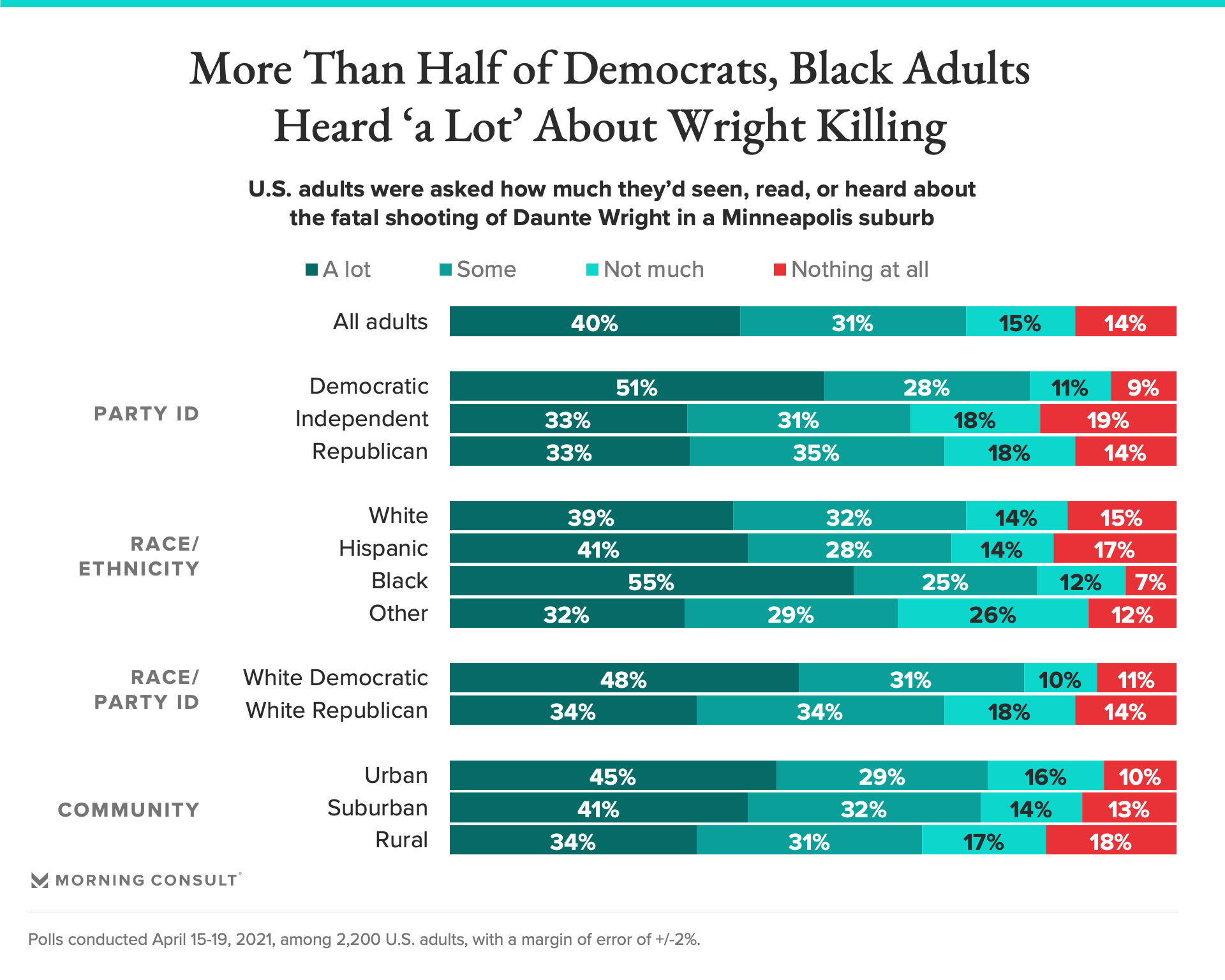
According to the survey of 2,200 U.S. adults, 2 in 5 respondents said they’d seen, read or heard “a lot” about the fatal shooting of Wright, including roughly half of Democratic and Black adults but just a third of Republicans and 39 percent of white adults. Similar splits appeared in the share of adults who reported hearing “a lot” about the Chauvin murder trial, though respondents were generally more likely to say they’ve consumed news about the topic.
Amid protests outside Minneapolis, local officials in Brooklyn Center announced the resignations of Police Chief Tim Gannon and Officer Kim Potter, who fatally shot Wright during a traffic stop where she suggested she mistook her firearm for her Taser. Potter’s resignation has wide public support – including among Republicans – but partisans are split on what they think should happen next.
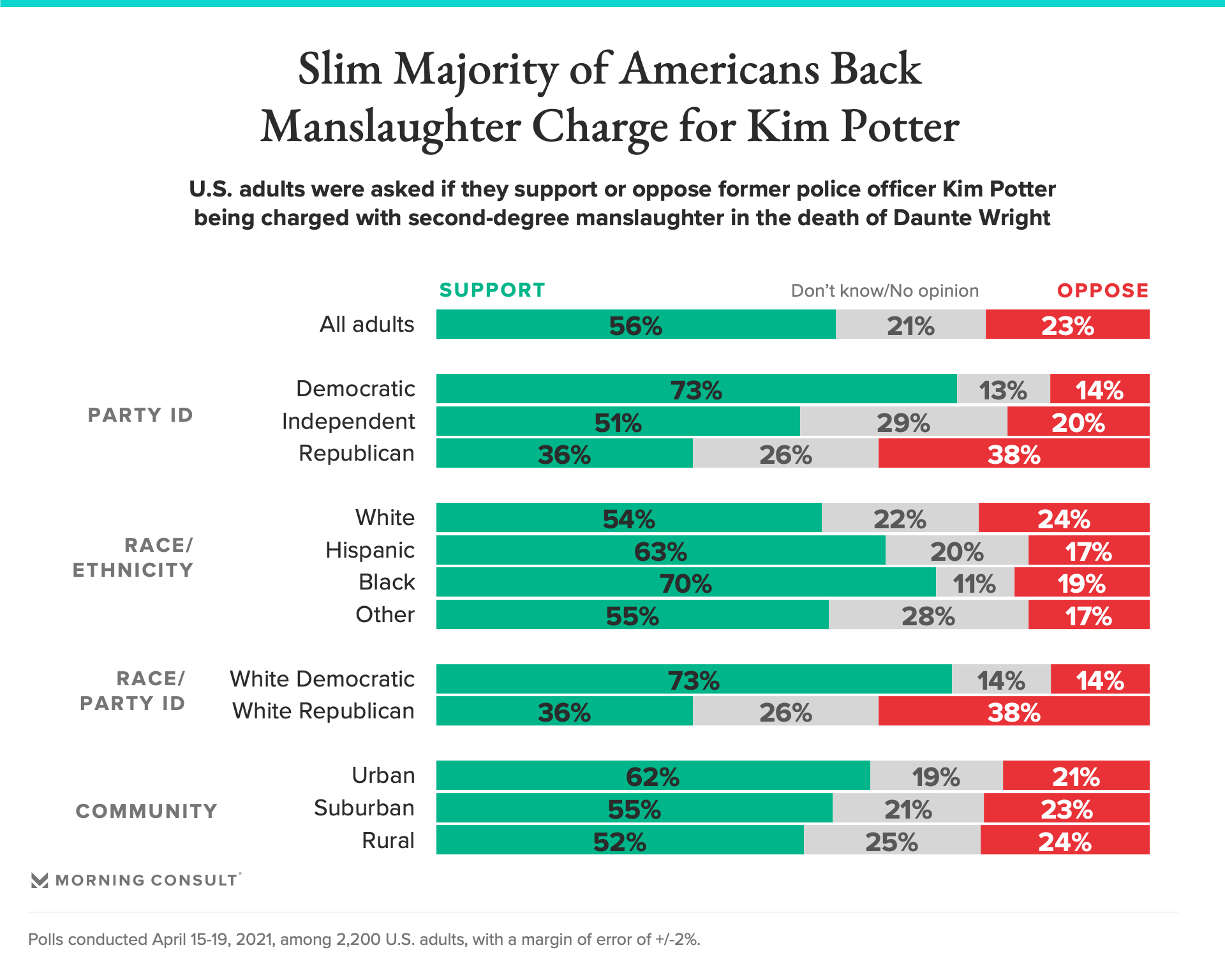
Over half of Americans (56 percent) -- including 7 in 10 Black adults and 54 percent of white adults -- said they support the decision by a local prosecutor to charge Potter with second-degree manslaughter, a crime of negligence under Minnesota law. Nearly 3 in 4 Democrats back the charge, while Republicans are almost evenly divided, with 36 percent in support and 38 percent opposed.
Potter’s actions – virtually impossible to decouple from the context of the ongoing Chauvin trial in nearby Minneapolis – raised questions about whether police officers are making mistakes or acting with malice in their harmful interactions with Americans. Those questions are key to how and whether law enforcement officers will be charged or convicted for harming or killing members of the public, and generally elicit stark divides among Americans when accounting for race and partisan affiliation.
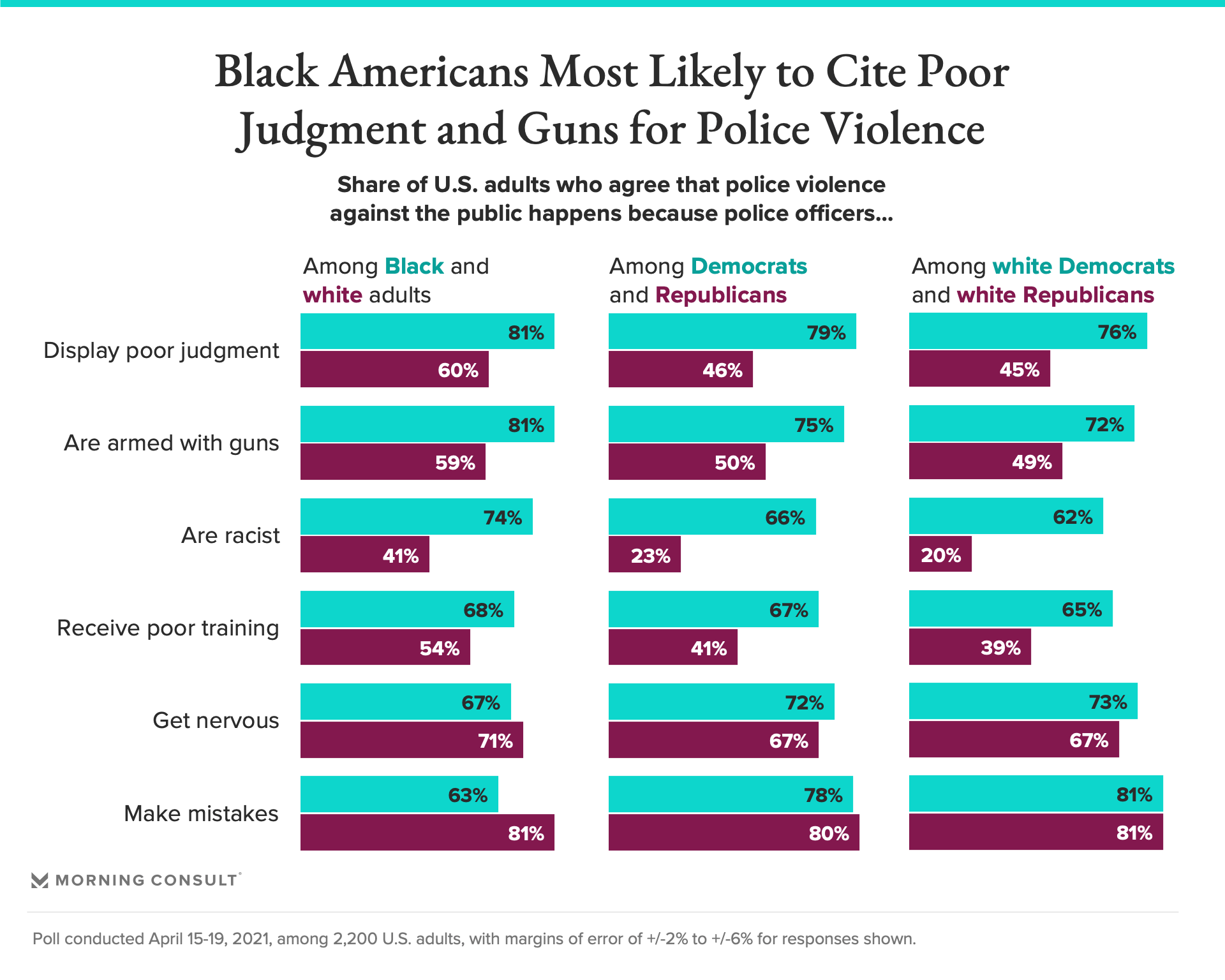
Republicans, Democrats and white adults are most likely to cite police officers’ mistakes as the cause of police violence, while Black adults are most likely to point to an officer’s personal judgment and easy access to lethal force – a topic of police reform that has gained some traction since the Potter incident.
With the resurgence of Black Lives Matter protests likely on the horizon given the latest incidents and the pending outcome of the Chauvin trial, calls to “defund the police” are also resurfacing after the organic slogan from the 2020 demonstrations was wielded by Republicans against Democrats on the campaign trail.
According to the new polling, support for defunding the police rests on weak political ground.
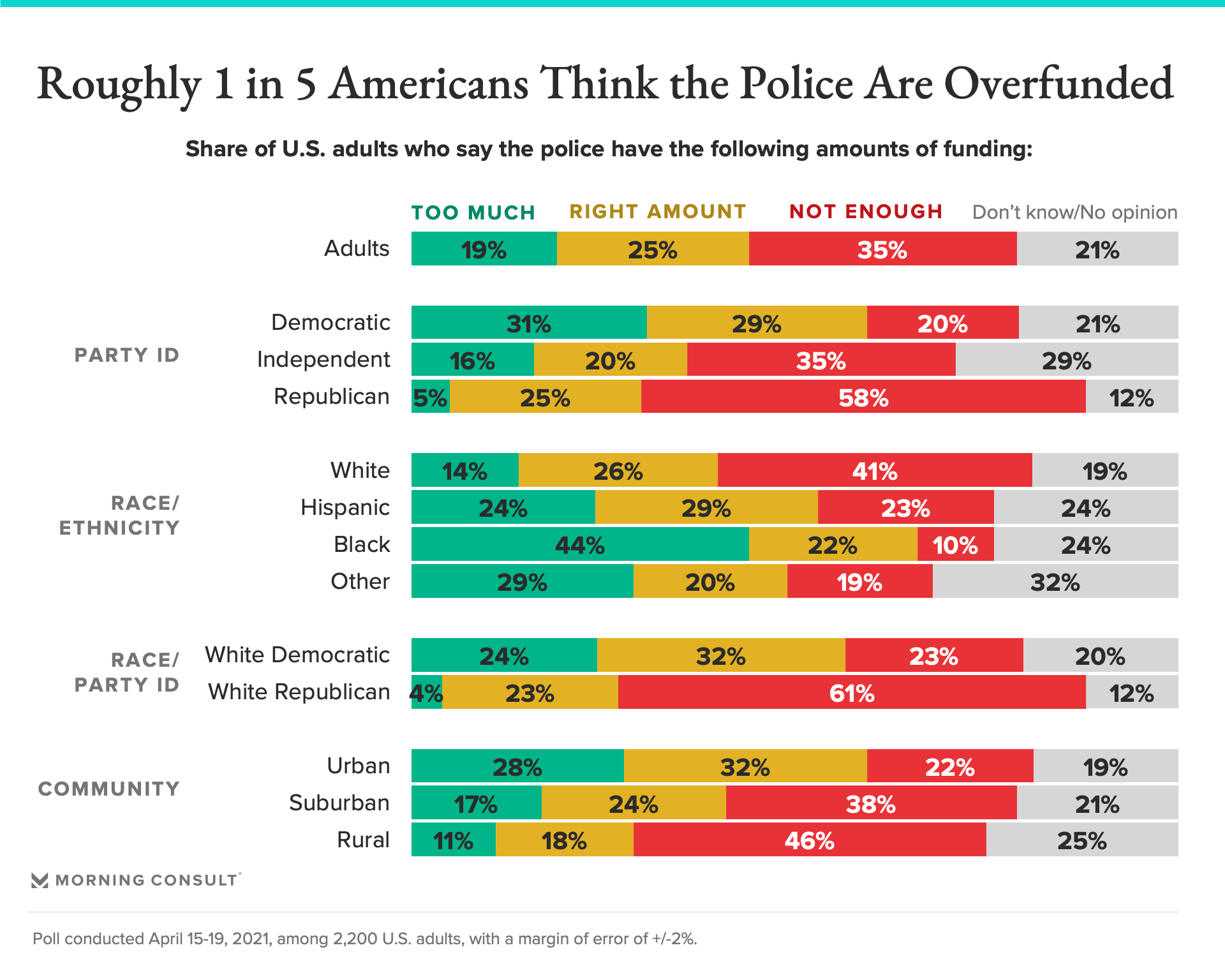
Only 19 percent of Americans say the police have “too much funding,” compared with 35 percent who said they do not have enough. Among Democrats, roughly 3 in 10 believe the police have sufficient or too much funding, while 20 percent said law enforcement is underfunded.
However, the issue has the potential to fracture the Democratic Party between two voting blocs that could be key in the midterm elections: While a 38 percent plurality of suburbanites say the police do not have enough money, a 44 percent plurality of Black Americans says departments are overfunded.
Eli Yokley is Morning Consult’s U.S. politics analyst. Eli joined Morning Consult in 2016 from Roll Call, where he reported on House and Senate campaigns after five years of covering state-level politics in the Show Me State while studying at the University of Missouri in Columbia, including contributions to The New York Times, Politico and The Daily Beast. Follow him on Twitter @eyokley. Interested in connecting with Eli to discuss his analysis or for a media engagement or speaking opportunity? Email [email protected].
Related content

As Yoon Visits White House, Public Opinion Headwinds Are Swirling at Home

The Salience of Abortion Rights, Which Helped Democrats Mightily in 2022, Has Started to Fade
